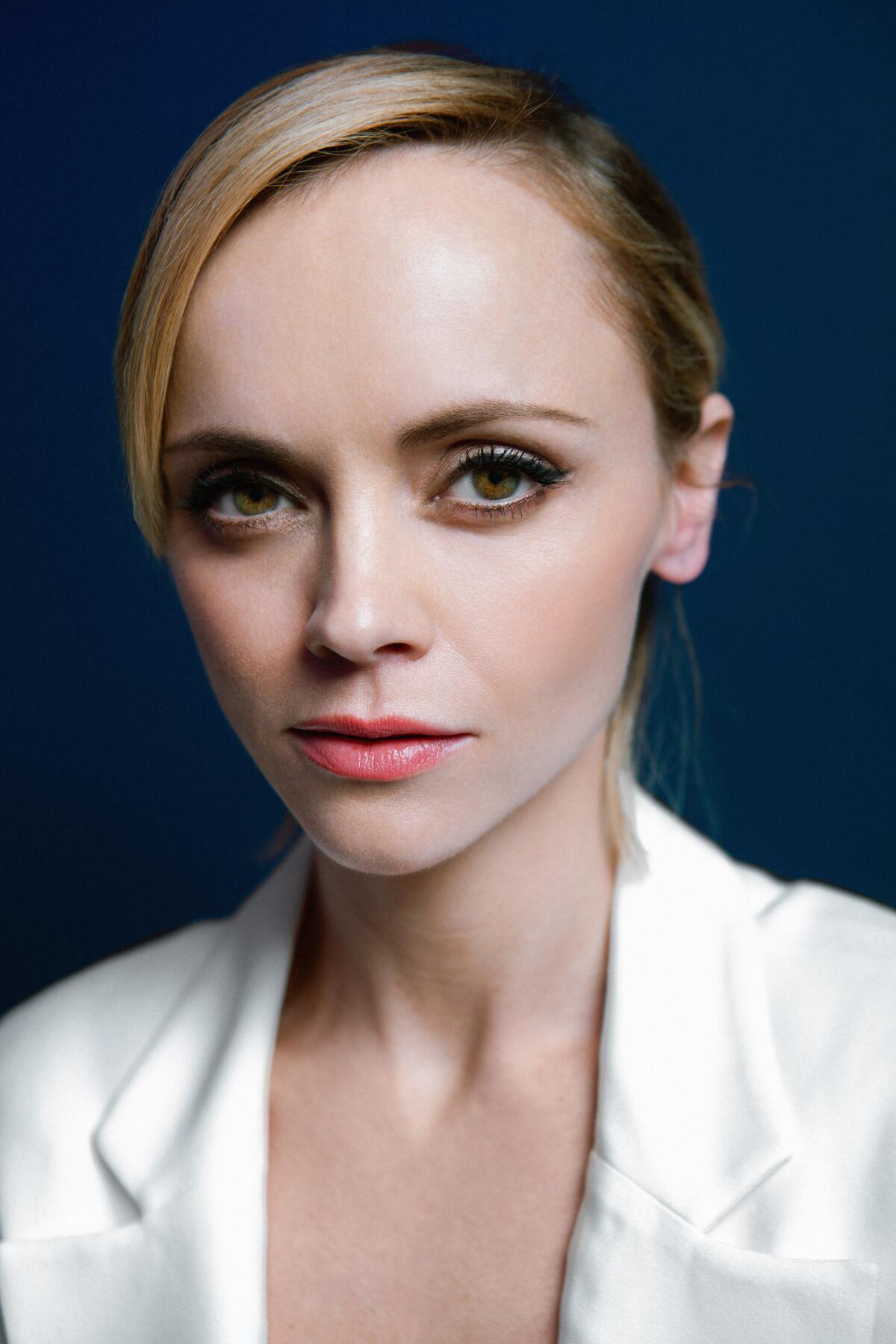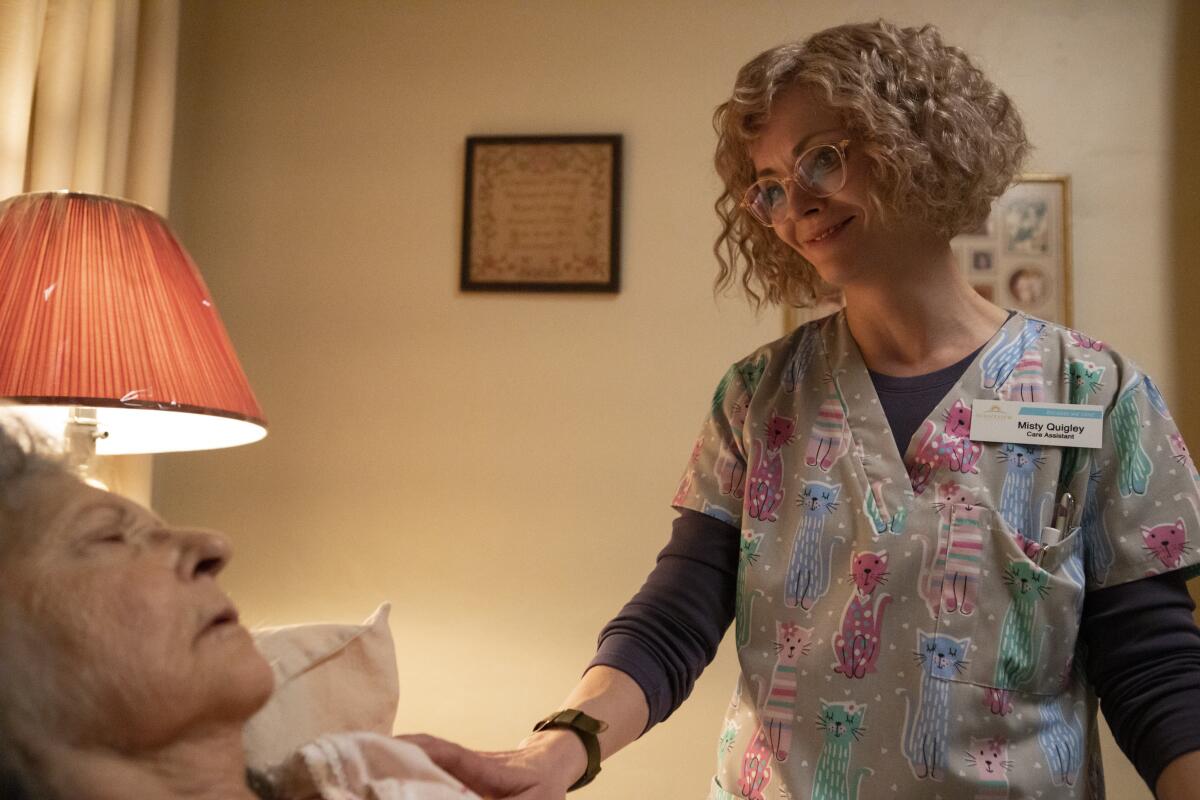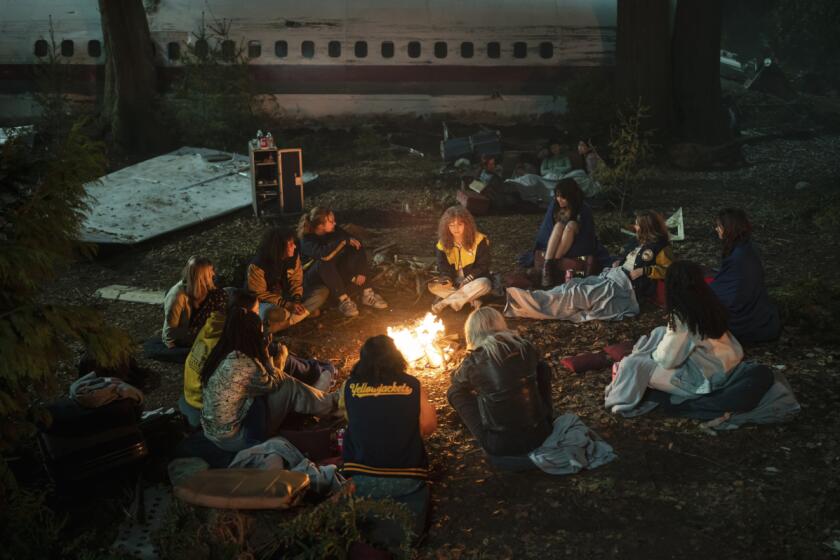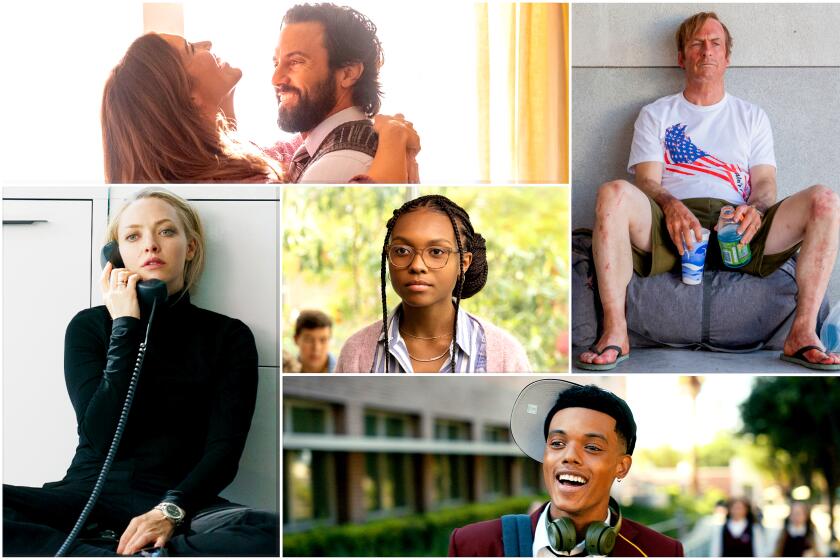Christina Ricci tried — and failed — to fit Hollywood’s mold. Lucky us

It started with a small plane crash in the woods and became a national obsession. “Yellowjackets,” which concludes its first season on Sunday, has become a north star for weekly TV viewers since it premiered on Showtime in November. Part survival drama, part witchy mystery, it follows the members of a girls high school soccer team — and, 25 years later, the grown-up survivors — who get stranded in the remote wilderness for 18 months after their aircraft goes down on the way to a tournament.
Merging “Mean Girls” social dynamics with animalistic ritual, cannibalism and a killer ’90s soundtrack, the series moves between 1996 and present day, with Christina Ricci, Melanie Lynskey, Juliette Lewis and Tawny Cypress leading the adult cast. As outcast Misty Quigley, Ricci portrays a conniving sociopath in nerd’s clothing. She’s a uniquely terrifying creature, thanks largely to Ricci’s talent for playing characters with dark, twisted cores: Wednesday Addams of “The Addams Family”; Katrina Van Tassel of “Sleepy Hollow”; Selby Wall, lover of female serial killer Aileen Wuornos, in “Monster.” But complex female roles weren’t always easy to find.
Ricci spoke to The Times about the Hollywood stereotypes she’s tried to avoid, the reasons she relishes “Yellowjackets” and why we should all stop making fun of Misty’s bad hair.
Call it a mix of “Lord of the Flies” and “Heathers.” Or the Spice Girls meet the Donner Party. “Yellowjackets” is the best show on TV right now.
Let’s start with the finale. I won’t talk spoilers, because fans might kill me just like Shauna killed — well, I won’t say in case they’re not caught up with Episode 9. But thank the spooky forest gods that there’s a second season. Do you know anything about what happens next?
I don’t know anything beyond Episode 10. Melanie always seems to know more than me. I feel like they trust her more. [Laughs.] They play the information very close to the heart, or the chest. What’s that expression? Sorry, I haven’t slept more than two hours at a time in weeks, so you’ll have to forgive me if I’m completely incoherent. [My baby is] 4 weeks today. So my brain, I put it in a cabinet somewhere. I’ll take it out when this is all done.
Historically in film and TV, women — particularly teenage girls — climbed to the top of the pack by being catty or cruel to one another. But in “Yellowjackets,” they’re strong survivalists. They’re resourceful. And they can be brutal. It’s been compared to “Lord of the Flies,” but with girls.
They’re not stereotypes. These are real individual characters, people that remind me of girls I went to school with. Fully formed, whole characters instead of caricatures ... These could be male characters, in a lot of ways. And it feels very real to me, like something that we don’t really see that often with film and television. If a woman is brutal, the entire show is about how brutal she is and not just another aspect of her character. I also loved the character I was playing. As an actress, I’m always looking for something that I haven’t seen a lot of in Hollywood.
Misty is fantastic and terrifying and tragic and ultracompetent.
And what I love about her is the way she expresses her rage. I love the idea of a person who, the only viable way for them to express their rage is passive aggression. She’s a small woman. She looks completely innocuous and has no social currency. She’s not “hot.” She’s not charming. She’s not cool. So imagine someone like that having gone through their whole life and is still in a place where she’s eking out entertainment and enjoyment and glee from everyday life. She’s squeezed like a stress doll. Ultimately, what happens is the eyes pop out and the ears pop out in this comical and yet horrifying way, and that’s very much Misty. She is so passive-aggressive, so full of edge, because she’s got so much rage by having been thwarted her whole life. But she can’t express it in the way a 6-foot-tall man would. So it’s all smiles and masking everything. That really awkward laugh when she feels uncomfortable or nervous.
The penultimate episode of ‘Yellowjackets’ offers a creative vision of trauma’s aftereffects unlike anything else on TV. Here’s what it means.
In what ways, if any, did you relate to her?
I am a small woman who apparently is adorable to people who like to touch me and not take me seriously and like to assume I’m stupid before I open my mouth. And I’m an actress who didn’t go to college, so I must be really dumb. But I can’t be directly hostile or directly confrontational. I deal with my anger in a very passive-aggressive way as well when I’m out in public or in the streets or dealing with someone in the parking lot who’s cut me off. So I very much related to that, and I love the idea of getting to show that because I don’t feel like I’ve ever played anything where I got to show that manifestation of rage.
Yet she’s also a sociopath whose manipulation and ruthlessness serve her well in a live-and-let-die setting.
The pack is not wrong to shun her. They sense there is something wrong with her, which is why she’s not allowed into the fold. It is a really great, fair, complicated character because you kind of empathize with the fact that she’s always wanted to be accepted and never has been. But then she shows you exactly why she’s not accepted and invited to the party.
And her unfortunate sense of style doesn’t help endear her to the crowd.
Sammi [Hanratty, who plays the younger version of Misty] and I have both talked about this. When we put on the glasses and the wigs, all of a sudden people would start treating us differently. People would start teasing me and making corny jokes, dismissing me. I was no longer important, and, in some cases, I was invisible, even though I was like No. 3 on the call sheet. It didn’t matter. People react to seeing someone who so clearly has no social value and seems so innocuous. She and I talked about how it’s so informative to be treated that way and to then apply that to playing a character that’s been treated this way her whole life.

From “Yellowjackets” to “Hacks” to “I May Destroy You” to “Never Have I Ever,” the expressions of female anger are becoming more nuanced, varied and raw.
When I was a teenager, I read biographies of famous women, and they always seemed to have these mental breakdowns and they’d have to go to an insane asylum. I was obsessed with this as a child. Like, “Wow, it’s really crazy that women just were going insane all the time!” That’s what I thought. As I got older, I was like, “Oh, no, she was just having a normal reaction to her life but was not allowed to express rage, wasn’t allowed to express unhappiness.”
You’ve been acting since you were a kid and have played so many interesting and offbeat characters, but I’m assuming those roles were not easy to find. Now there are projects like “Yellowjackets.” Have you and your castmates talked about the way things have changed for you as performers as the culture has changed?
We’re very aware that we’re getting to play more and more interesting characters because of the time where we are. We have discussed the way that things have changed just in terms of being an actress — what you’re allowed to request for yourself. A lot of the younger girls on this show are very much able to stand up for themselves and say, “No, I won’t do that. I don’t want to do that. I don’t like how I’m being treated.” And to witness that, having been their age on film sets, was sort of like, “Oh, my God, this is amazing. So are we all allowed to do this?” It’s so fun not to be hampered by all the traditional requirements that there used to be for female characters ... in terms of what you are allowed to express as a working actress that would not throw you into the realm of “difficult.”
The TV obsessives here at The Times select the new and returning shows they’re most looking forward to this year.
I assume you were deemed “difficult” when you didn’t want to take on stereotypical roles. Was there ever a point where you thought of packing it in?
I’ve done this my whole life, so there’s nothing else I’m really going to do. I’ve always felt that way. But there was definitely a period of time when I didn’t fit into anything that was being made. I was constantly being asked or having to go and audition for rom-coms and the things that were available for actresses in my age range, and I didn’t fit into any of them because, I don’t know, I’m just a different kind of actress. It was a very tough period of time. Unfortunately, I didn’t have the presence of mind that young women have right now. I tried very hard to change myself and make myself so that I would fit into those kinds of parts and movies, and it just never worked.
What was the most challenging aspect of working on “Yellowjackets”?
Misty is a character who expresses herself in a way that people are unfamiliar with. Sometimes people would feel that what I was doing would not be recognizable because it wasn’t traditional. “How do we know she’s angry if she’s smiling?” There would be discussions about making her more relatable, but I felt like, we’re in a time and place now where you don’t have to see yourself in the character to be interested or even sympathize. It was tough for me because I like to be bold, to make very strong choices and kind of ride the edge. Sometimes maybe it’s too much. Finding that balance where people felt that she was still “relatable,” while still being true to the character that I wanted to play, was difficult.
The soundtrack of “Yellowjackets” is so fantastic, from Hole to Liz Phair to Salt-N-Pepa.
Mazzy Star is in there and some other great bands and songs that I forgot about. I was a big PJ Harvey fan as a teenager, and I actually lived in New Jersey up until 1994, and I was playing on a girls soccer team. That’s totally what I was listening to and what I was doing. It’s kind of funny.










